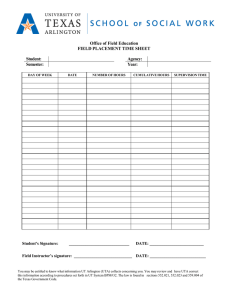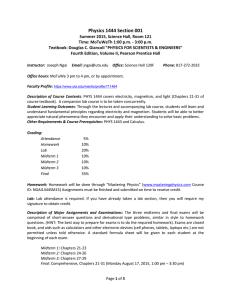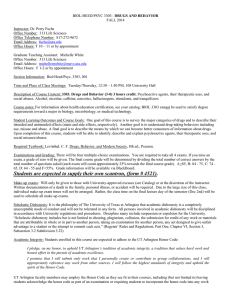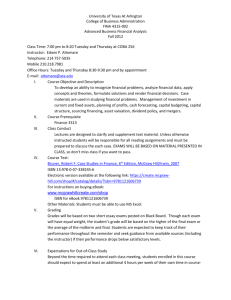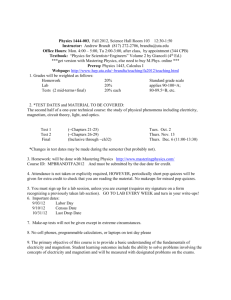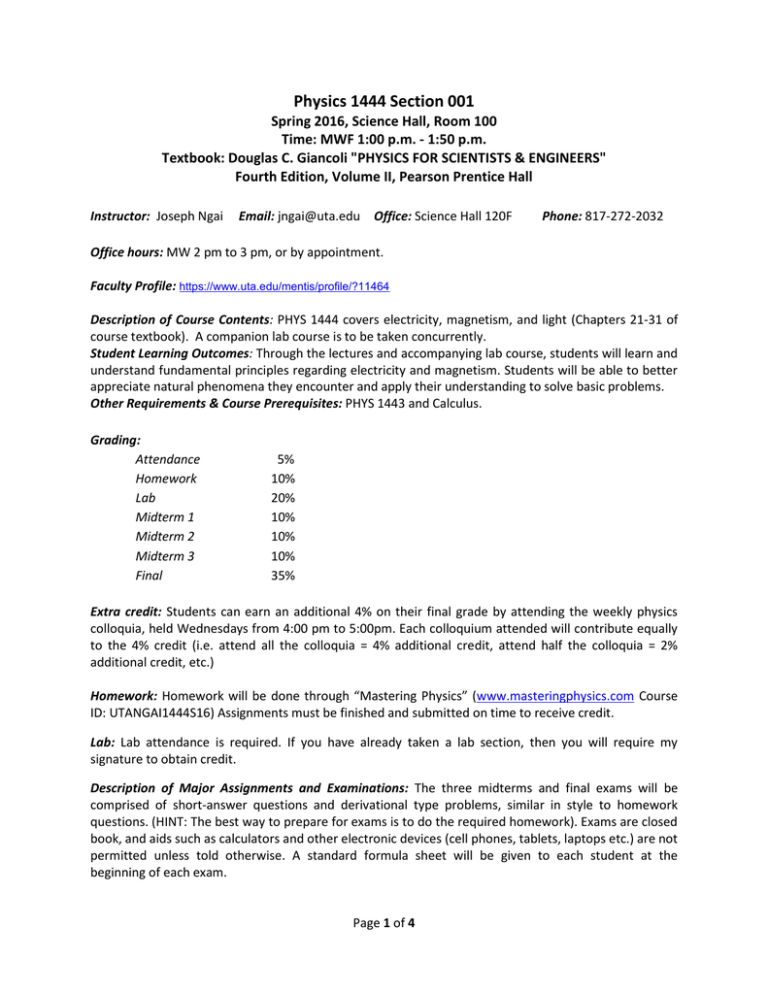
Physics 1444 Section 001
Spring 2016, Science Hall, Room 100
Time: MWF 1:00 p.m. - 1:50 p.m.
Textbook: Douglas C. Giancoli "PHYSICS FOR SCIENTISTS & ENGINEERS"
Fourth Edition, Volume II, Pearson Prentice Hall
Instructor: Joseph Ngai
Email: jngai@uta.edu Office: Science Hall 120F
Phone: 817-272-2032
Office hours: MW 2 pm to 3 pm, or by appointment.
Faculty Profile: https://www.uta.edu/mentis/profile/?11464
Description of Course Contents: PHYS 1444 covers electricity, magnetism, and light (Chapters 21-31 of
course textbook). A companion lab course is to be taken concurrently.
Student Learning Outcomes: Through the lectures and accompanying lab course, students will learn and
understand fundamental principles regarding electricity and magnetism. Students will be able to better
appreciate natural phenomena they encounter and apply their understanding to solve basic problems.
Other Requirements & Course Prerequisites: PHYS 1443 and Calculus.
Grading:
Attendance
Homework
Lab
Midterm 1
Midterm 2
Midterm 3
Final
5%
10%
20%
10%
10%
10%
35%
Extra credit: Students can earn an additional 4% on their final grade by attending the weekly physics
colloquia, held Wednesdays from 4:00 pm to 5:00pm. Each colloquium attended will contribute equally
to the 4% credit (i.e. attend all the colloquia = 4% additional credit, attend half the colloquia = 2%
additional credit, etc.)
Homework: Homework will be done through “Mastering Physics” (www.masteringphysics.com Course
ID: UTANGAI1444S16) Assignments must be finished and submitted on time to receive credit.
Lab: Lab attendance is required. If you have already taken a lab section, then you will require my
signature to obtain credit.
Description of Major Assignments and Examinations: The three midterms and final exams will be
comprised of short-answer questions and derivational type problems, similar in style to homework
questions. (HINT: The best way to prepare for exams is to do the required homework). Exams are closed
book, and aids such as calculators and other electronic devices (cell phones, tablets, laptops etc.) are not
permitted unless told otherwise. A standard formula sheet will be given to each student at the
beginning of each exam.
Page 1 of 4
Midterm 1: Chapters 21-23
Midterm 2: Chapters 24-26
Midterm 3: Chapters 27-29
Final: Comprehensive, Chapters 21-31 (Monday May 9, 2016, 11:00 am – 1:30 pm)
Policy on missed exams: No make-up exams will be given except in the case of extreme medical
emergencies, which will require a Doctor’s note.
Attendance: Attendance will be taken randomly 3 times during the semester. If found absent, 1.7 % will
be taken off your final grade for each instance (i.e. total of 3 x 1.7% ~ 5 % off final grade if found absent
all 3 times). You can avoid having marks deducted for absences simply by emailing me prior to or
immediately after a missed lecture.
Drop Policy: Students may drop or swap (adding and dropping a class concurrently) classes through selfservice in MyMav from the beginning of the registration period through the late registration period.
After the late registration period, students must see their academic advisor to drop a class or withdraw.
Undeclared students must see an advisor in the University Advising Center. Drops can continue through
a point two-thirds of the way through the term or session. It is the student's responsibility to officially
withdraw if they do not plan to attend after registering. Students will not be automatically dropped for
non-attendance. Repayment of certain types of financial aid administered through the University may
be required as the result of dropping classes or withdrawing. For more information, contact the Office of
Financial Aid and Scholarships (http://wweb.uta.edu/aao/fao/). Last day to drop: April. 1st 2016.
Americans with Disabilities Act: The University of Texas at Arlington is on record as being committed to
both the spirit and letter of all federal equal opportunity legislation, including the Americans with
Disabilities Act (ADA). All instructors at UT Arlington are required by law to provide "reasonable
accommodations" to students with disabilities, so as not to discriminate on the basis of that disability.
Any student requiring an accommodation for this course must provide the instructor with official
documentation in the form of a letter certified by the staff in the Office for Students with Disabilities,
University Hall 102. Only those students who have officially documented a need for an accommodation
will have their request honored. Information regarding diagnostic criteria and policies for obtaining
disability-based academic accommodations can be found at www.uta.edu/disability or by calling the
Office for Students with Disabilities at (817) 272-3364.
Academic Integrity: Students enrolled in this course are expected to adhere to the UT Arlington Honor
Code: I pledge, on my honor, to uphold UT Arlington’s tradition of academic integrity, a tradition that
values hard work and honest effort in the pursuit of academic excellence. I promise that I will submit
only work that I personally create or contribute to group collaborations, and I will appropriately
reference any work from other sources. I will follow the highest standards of integrity and uphold the
spirit of the Honor Code. UT Arlington faculty members may employ the Honor Code as they see fit in
their courses, including (but not limited to) having students acknowledge the honor code as part of an
examination or requiring students to incorporate the honor code into any work submitted. Per UT
System Regents’ Rule 50101, §2.2, suspected violations of university’s standards for academic integrity
(including the Honor Code) will be referred to the Office of Student Conduct. Violators will be disciplined
in accordance with University policy, which may result in the student’s suspension or expulsion from the
University.
Page 2 of 4
Student Support Services: UT Arlington provides a variety of resources and programs designed to help
students develop academic skills, deal with personal situations, and better understand concepts and
information related to their courses. Resources include tutoring, major-based learning centers,
developmental education, advising and mentoring, personal counseling, and federally funded programs.
For individualized referrals, students may visit the reception desk at University College (Ransom Hall),
call the Maverick Resource Hotline at 817-272-6107, send a message to resources@uta.edu, or view the
information at www.uta.edu/resources. (1) Physics Help Clinic Mon. to Fri. 11 am - 6 pm, SH007
(Basement). (2) for Freshmen: Start Strong Program (tutoring) see www.uta.edu/startstrong for more
information.
Lab Safety Training: Students registered for this course must complete all required lab safety training
prior to entering the lab and undertaking any activities. Once completed, Lab Safety Training is valid for
the remainder of the same academic year (i.e., through the following August) and must be completed
anew in subsequent years. There are no exceptions to this University policy. Failure to complete the
required training will preclude participation in any lab activities, including those for which a grade is
assigned.
Electronic Communication: UT Arlington has adopted MavMail as its official means to communicate
with students about important deadlines and events, as well as to transact university-related business
regarding financial aid, tuition, grades, graduation, etc. All students are assigned a MavMail account and
are responsible for checking the inbox regularly. There is no additional charge to students for using this
account, which remains active even after graduation. Information about activating and using MavMail is
available at http://www.uta.edu/oit/cs/email/mavmail.php.
Student Feedback Survey: At the end of each term, students enrolled in classes categorized as “lecture,”
“seminar,” or “laboratory” shall be directed to complete an online Student Feedback Survey (SFS).
Instructions on how to access the SFS for this course will be sent directly to each student through
MavMail approximately 10 days before the end of the term. Each student’s feedback enters the SFS
database anonymously and is aggregated with that of other students enrolled in the course. UT
Arlington’s effort to solicit, gather, tabulate, and publish student feedback is required by state law;
students are strongly urged to participate. For more information, visit http://www.uta.edu/sfs.
Final Review Week: A period of five class days prior to the first day of final examinations in the long
sessions shall be designated as Final Review Week. The purpose of this week is to allow students
sufficient time to prepare for final examinations. During this week, there shall be no scheduled activities
such as required field trips or performances; and no instructor shall assign any themes, research
problems or exercises of similar scope that have a completion date during or following this week unless
specified in the class syllabus. During Final Review Week, an instructor shall not give any examinations
constituting 10% or more of the final grade, except makeup tests and laboratory examinations. In
addition, no instructor shall give any portion of the final examination during Final Review Week. During
this week, classes are held as scheduled. In addition, instructors are not required to limit content to
topics that have been previously covered; they may introduce new concepts as appropriate.
Emergency Exit Procedures: Should we experience an emergency event that requires us to vacate the
building, students should exit the room and move toward the nearest exit, which is located to your left
as you exit from either the front or rear of the lecture hall. When exiting the building during an
emergency, one should never take an elevator but should use the stairwells. Faculty members and
instructional staff will assist students in selecting the safest route for evacuation and will make
arrangements to assist handicapped individuals.
Page 3 of 4
Course Schedule:
January 22, 25, 27: Chapter 21 Electric Charge and Electric Field
January 29, February 1, 3: Chapter 22 Gauss’ Law
February 5, 8, 10: Chapter 23 Electric Potential
February 12, 15, 17: Chapter 24 Capacitance, Dielectrics, Electric Energy Storage
February 22, 24, 26: Chapter 25 Electric Currents and Resistance
February 19: Midterm 1
February 29, March 2, 4, 7: Chapter26 DC Circuits
March 9, 11, 21: Chapter 27 Magnetism
March 23: Midterm 2
March 25, 28, 30: Chapter 28 Sources of Magnetic Fields
April 1, 4, 6: Chapter 29 Electromagnetic Induction and Faraday’s Law
April 8, 11, 13, 15, 18: Chapter 30 Inductance, Electromagnetic Oscillations and AC Circuits
April 20: Midterm 3
April 22, 25, 27: Chapter 31 Maxwell’s Equations and Electromagnetic Waves
April 29, May 2, 4, 6: Review and exam preparation
As the instructor for this course, I reserve the right to adjust this schedule in any way that serves the
educational needs of the students enrolled in this course.
Page 4 of 4

